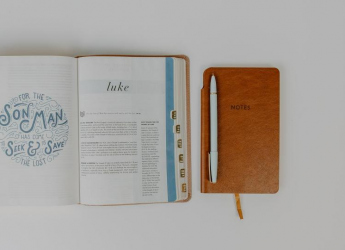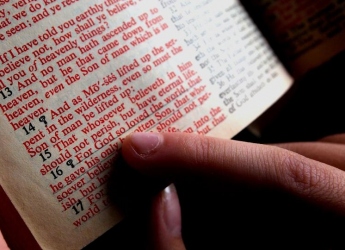Nov 15, 2016 00:00
The Bible calls us to be strong in the Lord and in the power of His might. Now the degree to which we are strong in the Lord is based on the degree to which we are dependent on Him and His Word. To depend upon the Lord and His Word is faith. So the degree to which we are strong in our faith is the degree to which we are strong in the Lord.
And not being weak in faith, he did not consider his own body, already dead (since he was about a hundred years old), and the deadness of Sarah's womb. He did not waver at the promise of God through unbelief, but was strengthened in faith, giving glory to God, and being fully convinced that what He had promised He was also able to perform.
Romans 4:19-21 (NKJV)
Now our text says that Abraham was not weak in faith, but strengthened in it. If you are weak in something you have a weakness in that area and if you are strengthened in something you have a strength in that area. In other words you are strong in that area. So if Abraham was strengthened in faith He got strong faith. So that tells us there’s such a thing as strong faith and there is such a thing as weak faith. So what kinds of faiths are these? What makes up for strong faith and what makes up for weak faith?
The Bible says that Abraham was not weak in faith for he did not consider his own body which was already dead as far as child bearing was concerned or the deadness of Sarah’s womb. Abraham was a hundred years old and Sarah was ninety years old when the promise came. (Gen. 17:17.) Naturally and biologically speaking they stood no chance of getting a baby. But now the Bible says that Abraham was not weak in faith for he did not consider that fact. It was a fact that they stood no chance of getting a baby, but Abraham did not consider it. That means that if Abraham could have considered the negativity of the circumstance he would have been weak in faith. So then one acquires a weak faith by considering the circumstance.
In our study on little faith, we said that little faith comes from considering one’s ability to solve the problem. Peter had little faith while he tried to walk on water for he took it upon himself to walk on the water. He saw it as a display of his abilities when he walked on water and as soon as he saw the boisterous waves he began to doubt for he wondered how he could manage. Little faith puts confidence in the arm of the flesh. “Cursed is the man who trusts in man and makes flesh his strength.†Jeremiah 17:5. Man in this case includes you because you are a man. So if your strength is in yourself you’re destined to fail, for a curse empowers you to fail. A blessing empowers you to prosper while a curse empowers you to fail.
If you are a person of little faith you’re destined to fail for you’re already cursed. If you put it upon yourself to meet your needs apart from the Lord you’re destined to fail for your strength is small. Little faith is a close relative of pride. The difference between little faith and weak faith is that little faith has confidence in the arm of the flesh while weak faith has limited confidence in the arm of God. Weak faith is circumstantial. It first considers the size of the problem to decide whether it will count on God or not. For instance, if it were healing that one needed, he would first consider how big it is to decide whether he will trust God or not. People of weak faith are ready to trust God for small problems but not for the major ones. Their faith is not based on God’s word, it’s based on the magnitude of the problem. The smaller the problem, the more likely they are to trust God and the greater the problem the less likely they are to trust Him.
Your faith is weak if you can only trust God to help you when the natural circumstances are in your favor. Your faith dies when the circumstance looks big. In John 11, Mary and Martha had weak faith for they could only trust Jesus to a certain extent. As long as the problem was sickness they would trust Him but beyond there they couldn’t. They could only wish that Jesus had come before Lazarus died. They couldn’t see much help in His coming after the death of their brother. Their faith was built upon the circumstance and not on the Word. Had their faith been built upon the Word, they would have been exceedingly happy that He had finally come rather than lament that He had not come in good time. Had Abraham been of weak faith he would have lamented that God had not given His promise of a son when he and his wife Sarah were biologically able to bear children. He would have said, “Lord, had you said this when we were young we wouldn’t have been barren.†Thank God Abraham believed God despite the circumstance working against him.
In Numbers 11:21-23, it was a display of weak faith for Moses to reason with God how impossible it was for Him to fulfil His word. He said to Him, “The people whom I am among are six hundred thousand men on foot; yet You have said, ‘I will give them meat, that they may eat for a whole month.’ Shall flocks and herds be slaughtered for them, to provide for them? Or shall all the fish of the sea be gathered together for them, to provide enough for them?†Weak faith reasons a lot. It considers the circumstance more than God’s word. Using sickness as an example, weak faith will say, “All the people who got this sickness have died, no one has ever recovered. What makes me any different from them? I can’t be healed.†Now according to Psalm 103:3 God is the healer of all your diseases, not only the minor ones.
God does not depend on a circumstance for Him to do something. Circumstances don’t work for and don’t work against God either. He is above the limitations of the natural world. He is the Creator of the natural world and so cannot be limited by His own creation. The situation, whatever it is, does not have to look good for God to change it. Don’t let your faith in God be based upon the ease or the difficulty of solving the problem. If He said He’ll do something, let Him do it. Don’t take it upon yourself to think of how He will do it. His word says that it is impossible for Him to lie, and that means He can’t say He will do something that He knows he can’t. He already knows about the circumstance and it is His responsibility to fulfil His Word not yours. It is God’s job to make good His word, not yours.
If you found this article helpful, kindly give us a like and share with your friends. Our study will continue in the next article.





